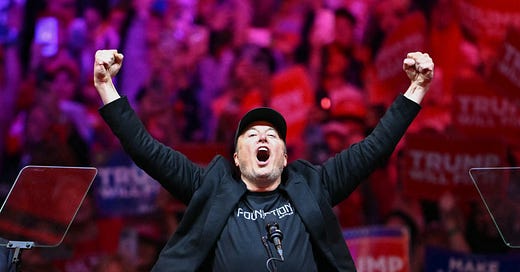Eat the Billionaires
There’s another current of populism rippling beneath the surface in America. Someone is going to find a way to harness it.
For 48 hours after his arrest, conservative media tried to make Luigi Mangione a weapon in the culture war.
They quickly abandoned this effort. Are you curious as to why?
Today we’re going to talk about Luigi Mangione and billionaires and popular resentment—and what it could mean for our politics. We’re going to try to do so without making a lot of value judgments. I don’t want to talk about what the popular mood should be, I want to explore what the popular mood is.
So I want to make this clear right up front: Today’s newsletter is not about the morality of the murder of the UnitedHealthcare CEO. It’s not about how people should feel about it.1 It’s about how people do feel about it, and what those feelings portend. We’re going to talk about populism. We’re going to talk a bit about class warfare.
But first, we need to set the table with Elon Musk—a prime example of the ultra-wealthy who operate outside the boundaries of law.
Let’s go.
1. Elon
Bloomberg’s Matt Levine wrote yesterday about how much the law does not apply to Elon Musk:
I think a useful rough model is something like:
(1) You and I and most people are approximately 100% subject to the law. If we do crimes we’ll get arrested; if we commit securities violations we’ll get fined; if we drive too fast we’ll get pulled over.
(2) Elon Musk is, like, 60% subject to the law?
(3) In roughly a month, he will be, like, 20% subject to the law?
Musk is extremely rich, he’s litigious and willing to fight even without great legal arguments, he’s popular online and has a large army of fans who get mad at his critics, and he is essential to various essential companies. You can’t seriously expect all of the laws to apply to him.
Levine talks about two specific instances of the law not applying to Musk. The first is that SpaceX’s legal department has tried to keep Musk from applying for a higher security clearance, because they are certain that his drug use and contacts with foreign governments hostile to the United States would be . . . problematic.
But of course that doesn’t matter because the incoming president is going to share whatever classified information he wants with Elon.
So those particular laws do not apply to him.
Neither does securities law.
In 2022 when Musk began his takeover of Twitter, he bought 9 percent of Twitter’s stock. The law requires anyone purchasing more than 5 percent of a publicly traded company to disclose the purchase within 10 days. Musk waited 21 days. Then, when Musk did make his disclosure, he lied.2
Here’s Levine again:
You might have expected that the US Securities and Exchange Commission, seeing this absolutely open-and-shut violation of the law, would have sued Musk within a few weeks. Instead the SEC has spent the last two years making vague burblings about investigating Musk and repeatedly questioning him about what seems, from the outside, like an extremely simple legal violation.
Which, again, is weird, and not how other people get treated. (Here is a September SEC announcement of “settled charges against 23 entities and individuals” — including Goldman Sachs and Alphabet Inc. — “for failures to timely report information about their holdings and transactions in public company stock.”) But the point is that, if Musk has been 60% subject to securities law for the last two years, that number is going to drop precipitously in about a month.
Anyway, the SEC is trying to get this teensy-weensy violation put to bed before Biden leaves office, so it sent Musk a letter telling him it was time to settle up.
Musk’s lawyer sent a reply to SEC Chair Gary Gensler telling him to get bent because in four weeks there’s going to be a new sheriff in town.
And then Musk published his lawyer’s reply and laughed about how the law doesn’t apply to him.
I’m not sure we have analogues for this. Normally when people flout the law they take pains to make it appear as though they’re not. They cover up their misdeeds or at least stay quiet.
Elon Musk’s approach is to brag about how he is an Übermensch to whom normal laws do not apply. So far this has worked out for him.
I wonder if it will continue to work out for him.
2. Luigi
As I said at the beginning, for the first day or two after Luigi Mangione was arrested, Conservatism Inc. tried to paint him as an elite liberal snowflake who had sinned against the great and good CEO class. They ridiculed Mangione and tried to hang him around the necks of Democrats and progressives. And then, quite suddenly, they abandoned this effort.3
Why?
I’m not a mind reader but I suspect it’s because their audience wasn’t with them. Some significant percentage of redpilled, anti-woke populists were sympathetic to Mangione.4
Here’s comedian Bill Burr saying the unsayable out loud:






